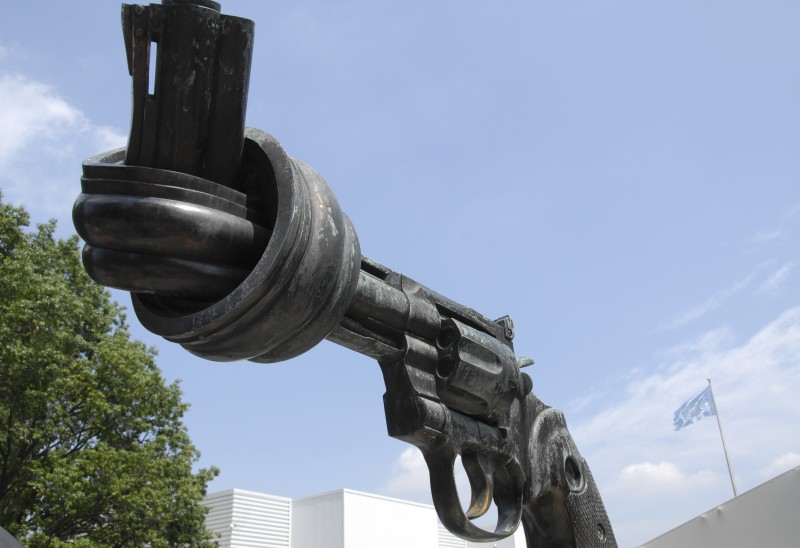
The bronze sculpture “Non-Violence” in front of the UN headquarters in New York, USA. Photo by Anne Hemeda, 19 June 2010.
Germany has broken a sad record and exported more small arms over the past year than ever before. On the net organisations and users call attention to the danger of small arms.
At the end of April the federal government announced that in 2013 it authorised the export of arms and munition worth 135.1 million euros; that is 43% more than in 2012. The ARD-Hauptstadtstudio, the Berlin TV studio of the federal broadcasting network, had already exclusively received this information from the Federal Ministry for Economic Affairs and Energy.
Germany is one of the world’s largest arms sellers. The research project “Small Arms Survey” of the Graduate Institute of International and Development Studies in Geneva assumes (report in English) that in 2010 only the USA exported more small arms and light weapons than Germany.
Small arms are weapons that can be carried and operated by a single person. They are most frequently used in civil wars, are mainly in private possession (report in English) and mostly kill civilians. UNICEF therefore also refers to small arms as the “weapons of mass destruction of the 21st century”.
Twitter user Christian Soeder therefore notes:
Kleinwaffen-Exporte sind Mist, viel schlimmer als Panzer. :/ http://t.co/Y2MdxUUb4G
— Christian Soeder (@christiansoeder) 9. Mai 2014
Damn small arms exports, they are much worse than tanks. :/
The parliamentary party Die Linke (The Left) explains the danger of small arms as follows:
Bei einer durchschnittlichen Verwendungsdauer [der Kleinwaffen] von 30 bis 50 Jahren stellt ihre massenhafte Verbreitung nicht nur heute, sondern auch zukünftig ein unkalkulierbares Risiko und ernsthaftes Problem für den Frieden, die Sicherheit und die soziale Stabilität vieler Staaten und Gesellschaften dieser Welt dar.
With an average period of use [of small arms] of 30 to 50 years, their mass distribution does not only represent an unpredictable risk and serious problem for peace, safety and social stability of many of the world’s nations and societies today but also in the future.
Via Twitter we are also reminded that small arms can be re-exported to third countries:
Würde mich nicht wundern, wenn Saudi-Arabien die von Deutschland gelieferten Waffen an Kämpfer in Syrien für den Bürgerkrieg weiterreicht.
— Andi Wagner (@Andi_Wagner) 9. Mai 2014
I wouldn’t be surprised if Saudi Arabia passed on the weapons delivered from Germany to civil war fighters in Syria.
Wir sind nur der Großhändler, an wen verkaufen die Einzelhändler? #Waffenexporte #Rüstung #Waffen http://t.co/LMnsT3ZJZJ via @SPIEGELONLINE
— John Connor (@whstlblwr_ger) 9. Mai 2014
We are just the wholesaler. Who do the retailers sell to?
Small arms also „facilitate abuse of girls and boys as soldiers,“ says Cornelia Walther, spokeswoman of UNICEF DRC. Ralf Willinger, children’s rights expert of terre des hommes, explains:
Ohne leichte,
kinderleichtzu bedienende Waffen wäre der Einsatz von Kindern an der Waffe nicht möglich.
Without light,
easyto operate weapons the deployment of children would not be possible.
The information from the Federal Ministry for Economic Affairs and Energy also shows that in 2013 Germany delivered small arms worth 34 million euros to Saudi Arabia. We reported about blogger Raif Badawi (our report in English), who was sentenced to ten years imprisonment, one thousand lashes and a fine for developing an internet forum in Jeddah. On Twitter the Badawi case is also linked to the arms exports:
http://t.co/cetbKVB5cw und dorthin liefert unsere #Regierung #Waffen?!
— Thomas Braun (@braun_info) 8. Mai 2014
And that’s where our government delivers arms?!
Twitter users ascribe hypocrisy and double standards to Germany when it comes to arms exports:
Deutschland – Bewahrer des Weltfriedens. Schön, wenn Bigotterie sich derart eindeutig selbst entlarvt: http://t.co/PQNvcy7kLy
— Die Fürstin (@Himmelsherrin) 9. Mai 2014
Germany – keeper of world peace. Nice to see bigotry expose itself this clearly.
Exportschlager deutsche Kleinwaffe – ein Hoch auf den dt. Wohlstand und Mauer hoch gegen das Übel auf der Welt! http://t.co/AXkQdCWLlw
— Markus Schaller (@medienschaller) 9. Mai 2014
Export hit German small arms – a cheer for German prosperity and wall up against worldwide evil! http://t.co/AXkQdCWLlw
Judith Brandner twitters that arms exports themselves may create a reason to flee:
Immer mehr deutsche #Waffen für arabische #Diktatoren: Werden dann auch die entsprechenden #Flüchtlinge aufgenommen? http://t.co/Cwdnj8Frt0
— Judith Brandner (@JudithBrandner) 9. Mai 2014
Ever more German arms for Arab dictators: Will the respective refugees be accommodated then?
In the Bundestag delegates of the German Green party request the establishment of “real transparency and parliamentary involvement in decisions regarding arms exports”. They claim that “information and the right to participation, which are decisive to control the policy of the Federal Government,” are withheld from delegates. The demands of the coalition fractions CDU/CSU and SPD and the statement of the Federal Government are not sufficient. The SPD and Die Linke fractions already joined an earlier request for the control of arms exports that included key parameters for a bill for an arms exports law in early 2013. Delegates from Die Linke even call for “a general ban of the export of weapons of war and other armaments”.






